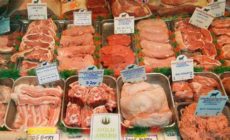With less than two months to go for the upcoming assessment to review the ban, it is unclear whether Ghana will pass the test.
The Ministry of Trade and Industry together with the Ghana Export Promotion Authority (GEPA) and the Ministry of Food and Agriculture have been in series of consultations not only to secure the lifting of the ban but to get Ghana’s agro produce to conform to the international specifications.
The EU banned the importation of vegetables and fruits to that economic bloc. They have since come twice to assess Ghana for a possible reversal of the ban but the country failed to pass the first two assessments.
There are concerns as to whether Ghana will meet the upcoming one slated for September.
While Ghana is struggling to deal with the European situation, which has immensely affected the country’s export fortunes, news broke early this month that China, another big trading partner of Ghana, has also banned the imports of vegetables and fruits from Ghana.
The Minister for Food and Agriculture, Dr Akoto Afriyie is confident that Ghana will pass the test for the ban to be lifted.
He said the EU had come up with certain conditions based on which the ban will be lifted and that the Ministry was making sure that appropriate actions are taken to address the challenges.
“We are taking steps to comply with the EU regulations and also trying to restructure our own internal arrangements as well as getting the right personnel manning activities at the ports of entry and in the various regions. So I’m very confident that with all the work we’ve done so far in collaboration with the stakeholders we are prepared now to receive the delegation from the EU to audit in September so that the ban can be lifted and enable business to go on,” he added.
As part of measures to address the situation, a Deputy Minister of Trade and Industry, Carlos Ahenkorah, said the Ministry of Trade and Industry has started pushing to get the Ministry of Food and Agriculture, which was responsible for the agency checking agro exports, to up its game because it was very demeaning for the country to have its exports returned.
“Very soon we will proactively get the problems resolved,” he said.
He charged the Ghana Exports Promotion Authority (GEPA) to “use its authority to also stamp something out.”
“GEPA must be able to stamp its authority on developments within the export sector. The Authority has to gather the facilitators of exports to come out with the challenges they have so that they could be addressed holistically,” he added.
On his part, Head of Standards Division at the Ministry of Trade and Industry, Michael Senaya said Ghana did not fail the previous assessments but it was a gradual process to address the challenges in key areas of Ghana’s agro export sector to meet the EU regulations.
“Not that they failed. A task force was set up and they were given 15-point area to fulfil, they have been able to meet some but they are expected to complete the remaining that by September,” Mr Senaya explained.
He confirmed hearing the report of the Chinese ban but said he had not received a formal statement to that effect.
Recently, Ghana’s export revenue has been dwindling due to fall in commodity prices on the world market and other internal factors. A protraction of the EU ban on Ghana agro exports will further worsen the situation.
A strong export base for Ghana is the only solution to reduce the country’s persistent balance of payment deficit while at the same time easing the pressure on the country’s foreign exchange reserves.
According to Executive Director of the European Business Organisation (EBO) here in Ghana, Nico van Staaldenuin, the EU has regulations just like any other bloc and there are no shortcuts to meeting such regulations.
“If you don’t do your inspection well and decide to relax the rules because you are dealing with a poor farmer, the exports will not enter the market they will be blocked and returned. That’s how come there is a ban in place,” he noted.
He added that corruption on the side of Ghanaian export officials might be another factor that has led to the ban.
“Sometimes because of corruption, the one exporting knows what the produce do not meet international standards but decides to bribe officials to stamp the certificate so he or she passes through but the produce fail to pass the test in Europe; when they catch a few people like that, Europe shuts the gate,” Mr van Staaldenuin lamented.
Commenting on whether or not Ghana will pass the upcoming assessment in September, the EBO boss said: “I know Ghana has made progress during the previous assessments but the control system which the EU takes seriously is still very weak.”
He said that could be a major determining factor of the outcome of the assessment., government is optimistic that Ghana will sail through.











 (Selorm) |
(Selorm) |  (Nana Kwesi)
(Nana Kwesi)